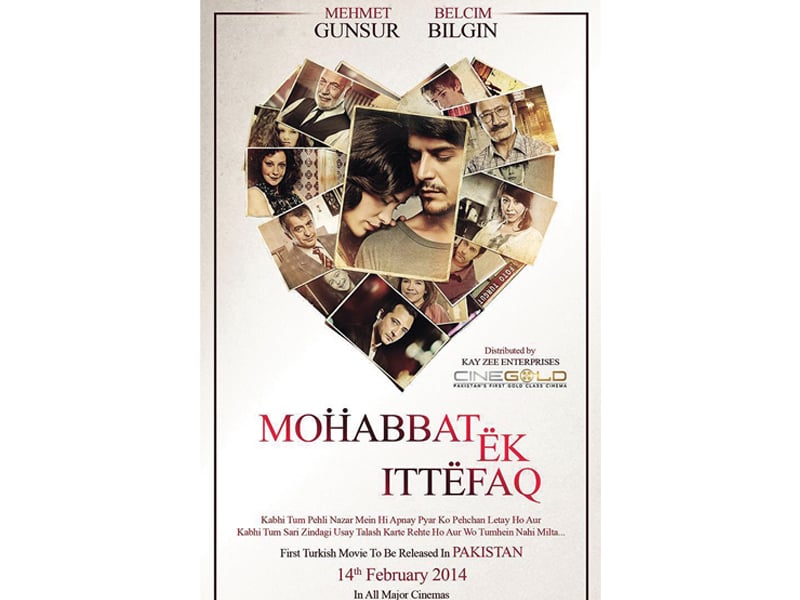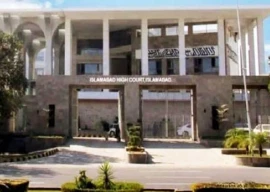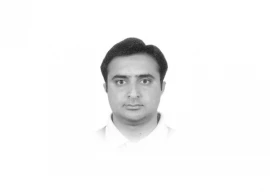
LAHORE:
The premiere of Mohabbat Eik Ittefaq, on February 13, marked the release of the first Turkish film in Pakistan. Initially, people were apprehensive, however, the film proved to be an interesting experiment for the local market.
Earlier this year, The Hindu did a feature written by Muralidhara Khajane, on the impending crisis surrounding the move to dub Bollywood films, being faced by the Kannada film industry. The issue was also faced by Tamil, Punjabi and other film industries who protested the influx of dubbed films.
In his opening paragraph, Khajane asks: “The dubbing row has a divided house. While the anti-dubbing lobby fails to give answers to practical questions, the pro-dubbing group cites only have economic reasons. Are languages and culture no longer important questions?”
The reality is that the shift towards multiplexes has changed the context in which cinema is approached. This is the advent of cinema-going culture, bred on a certain commercial ethos that looks at films as form of retail — something you can experience as part of the economic liberalisation.
The move towards dubbing in smaller markets is about economics and the drive for high-quality films, which, at times, the local industry fails to provide with consistency. Therefore, over the long-term, the local industry will have to ultimately accept dubbed-film culture.
The dubbing trend has been used all-over the Middle East, Europe, Russia and even South America. It’s a trend that has faced considerable opposition from local industries and will continue do so. In places such as Germany, voice-over artistes of A-listers such as Tom Hanks, Jack Nicholson and others, can establish themselves as stars in their own right.
One insider of Bahria Town’s Cinegold operation said that there is political dimension to this phenomenon — an agreement has been made to have more Turkish films dubbed in Urdu for the local market. The officials specified that the experiment was based on the success of Turkish dramas in the country. Interestingly, it also coincides with government’s initiative to promote a shared heritage with Turkey.
“We think to explore Turkish film industry will be a very good opportunity, because it’s close to our country and its culture. The common religion also plays a role. I think a wave has taken over because of the dramas; it’s a great prospect,” said a senior official.Mohabbat Eik Ittefaq has been dubbed over by local radio jockeys who have attempted to make the film more accessible to the local market. Before the premiere, RJ Dr Ejaz Waris admitted he had done several shows condemning the dubbed television dramas and was wary of the impacts of this ‘new trend’.
“I have spoken out against Turkish dramas on my show, but now my gut feeling is that a film has come along and we should try to experiment with it. My only concern is that it should not be at the expense of Pakistani films,” says Waris. His radio channel’s radio jockeys, such as Fatimah Khan and Muaz Raja, have done the voiceover for the film. Others include Tariq Rao, Mazhar, Areeba Sohail, Denials Sohail, Shazia Shahid, Shama, Naghnama Tahir, Umer Saud, Usama Bin Hijazy, Habiba etc. Waris adds that the challenge of dubbing was to ensure that the films integrity is maintained.
“It’s interesting because you want to see how they are able to maintain the emotions or integrity of the characters — it will be fun to see that,” adds Waris.
Overall, the laws of the market suggest that if more dubbed films are introduced in the market, provided that high quality is maintained, people will certainly be watching.
Published in The Express Tribune, February 15th, 2014.
Like Life & Style on Facebook, follow @ETLifeandStyle on Twitter for the latest in fashion, gossip and entertainment.
COMMENTS (19)
Comments are moderated and generally will be posted if they are on-topic and not abusive.
For more information, please see our Comments FAQ


































































Turkish women wear bikini on beaches. They consider themselves more European than Arab(atleast the younger turks and want to be part of EU). Is this culture common to Pakistan? I think Pakistan should screen Saudi movies as that's the closest to Pakistani culture.
some Pakistanis are ready to accept Arabs,Mongols,Turks and even Greeks as their ancestors although 99% of them are of Indian stock, which they like an Ostrich,are reluctant to accept publicly.self hating is the biggest symptom of a confused Nation.
starting with the names of Stars in this Turkish movie Mehmet Ghunsur and Belcim Bilgin....how Pakistani do they seem?...even a Ugandan name Idi Amin seems more familiar...
@someone: As far as the food bit is concerned, most of our dishes can be traced back to Central Asia(Very easily). Religion is a common denominator, however, attributes associated with the religion can be debated. We better work on commonalities BTW.
Just like Pakistanis feel like they are a part of the Arab world, the Turkish people feel they belong to Europe. But besides, religion, there is nothing really common between Pakistan and Turkey.
Even an Indian can't tell if someone is a Pakistani or an Indian - that is how close we are, and that is the reality. But the obsession of keeping a distance from India is making Pakistan do weird things, and in the end, making a mockery of the whole country.
So, now, instead of only Bollywood movies, Pakistan film industry has to worry about the Turkish movies too. How does it help?
And, BTW, Iranians make much better movies than the Indians (in general).
With all the talk about Turkish culture being similar to Pakistani culture and us sharing the same religion, I think a majority of common Pakistanis will have a heart attack if they realize the secular nature of the Turkish society and culture.
At first I was not very keen as this will hurt our local industry. However, if you look in the long term, this may actually help our local industry to produce better movies with higher quality. If these foreign movies set benchmarks against which the local industry will have to compete this can only be good thing.
At the same time there will always be a market for local movies. If there is a good local movie and a good foreign one, I would like to see them both.
Americana nd English movies are dubbed into French and German, but both France and Germany make movies of their own, which have a market not just in their local countries but abroad too.
So maybe we shouldn't be so pessimistic.
Regards culture, I have lived in turkey and yes the culture is very similar, at points even identical. This culture is similar to Pakistan and north India, as is Iranian culture to us. However, where Pakistanis are much more similar to Turks than with Indians is with regards to religion. Major points in life are marked by religion, birth, death, marriage etc. and I this respect Turkish and Pakistani people are almost identical, even the way Islam is practiced is very similar.
The majority of Pakistanis and the majority of Indians will always have this difference. It can be seen as minor or major, depending on how you look at religion in your own life. But this is a difference Pakistani and Turkish people do not have.
Turkey is a much more modern and advanced society in terms of material wealth than Pakistan. How they, as a modern Muslim country that is similar to us in religious and cultural practice, have adopted, interpreted and internalized modernity is a very good framework for us as Pakistanis.
At the same time we should look to see how India does the same, especially I terms of practicality with land and water management etc. as our physical environment is similar to theirs.
It should not be one or the other, we as a people and nation are an amalgamation of both of these ancient cultures and peoples. We should learn and take the best from both of them.
In this way we are actually a very unique culture.
Since when did Pakistan became a secular country as well.
Pakistan is really confused about their roots. Turkey? Lol. Pakistanis have this knack of jumping on some one elses wagon, all the time.
ET plz publish.
Turkish dramas & then movies to be promoted so that Pakistanis can become vulgar/partial nudity etc.
Good move.
However, except for a couple of Turkish films a year, the rest are utter nonsense just like Bollywood.
However, I would be very happy to see Iranian films being dubbed into Pakistani and Indian languages.
The entire world has a lot to learn from Iranian cinema.
Some of their films are the best films of all time. Those powerful images of simplistic narration of complex emotions are entrenched in the minds of true lovers of the art.
If anyone has not seen it, please, by hook or crook, watch "a separation". It's one of the greatest films to have been made in the last decade. Such subtlety and perfection is impossible even in a Hollywood film.
Hats off to Iranian filmmakers.
@Samirah: Your is not a secular country by the way. Do you even know your country's name? Its "Islamic Republic Of Pakistan" FYI.
@Samirah: @Ahsan Well as I said, it is difficult for Pakistanis,specially english speaking ones, to differentiate between religion and culture. Saudi Arabia/Egypt/Algeria are Islamic countries. Do you think your culture is similar to theirs? Don't need to go that far, how many in Pakistan Punjab or Sindh think that theirs and Pushtoon culture is same?Samirah, you looked so excited for some words being similar in Turkish and Urdu but the country where Urdu was born is alien to you from cultural perspective. How naive. Ahsan, may be its a matter of pride for you that most can't differentiate between turkish and pakistani men, but Turkish may not that take it generously ;).. Also, I am not against import of Turkish movies in Pakistan but I find it grossly improper when people give lame excuses in the name of religion and culture to import them while in the same breathe they curse Indian movies, which by the way share same language,for being cultural invasion. Last but not least, Turkey has been trying to join EU for so many years now and are not too eager to remain in Asia. I think that is enough to say who Turkish think they are "closer" to
If religion is the parameter for entertainment, then saudis might make some desert nigga movies. They will be super- duper hit in pakistan coz they have same 'culture' u know. But alas there won't be any women in there, only males can don burkha to do the female part but guess what pakistanis will still drool over their eyes and hands. Sad set of affairs it could be anything but pakistanis for entertainment.
Even the word Urdu comes from Turkish language. . When Muslims came from Central Asia, including Ottoman Empire, even blood mixed. We have 'Hur' tribe living in Pakistan (big Tribe... they follow Pir Pagara of Sindh)... Hur is a big Turkish tribe too. . Turkish food is very popular in Pakistan (Kofta is a Turkish dish that they brought to India)!. . I never felt more welcome with a Pakistani passport anywhere other than Turkey. As a thank you, I am learning Turkish. . Pakistanis (at that time Indian Muslims) gave their everything to send donations to Turkish caliphate. Turkish children sent their pocket money when there was earthquake in Pakistan. . Distributor of this film is Express Media (which owns this newspaper). . As far similar culture in India, don't remember any Indian actor raising funds for Pakistani flood or earthquake victims.
@someone stop being jealous! My sister in laws Turkish and yes our cultures are quite the same and even some words in the Turkish language are quite similar to Urdu. Islam is the main religion of the Turkish people in Turkey, it's an secular Muslim country as well as Pakistan. Some women wear the burka and some women don't, its their choice.
So who is importing this film? Why there are no names of the distributors? And Turkey is closer to our country and culture? Really? Are you kidding me. Does anyone even know where exactly is Turkey situated and whats their culture. Why none of this has been challegned or asked in this article..
@someone: don't be jelus, you wants your Indian movies to be plaid in Pakistan, that's why you do the nefarious commenting. Let's face it - religion and culture is same things, and most people can't "differentiates" between Pakistani and Turkish mens.
LOL so Turkey is close to the culture of Pakistan :). Hmm I wonder how Turkish do Bhangra or gidda. Or Turkish women are wrapped in veil head to toe. Or if Turkish food is very famous in Pakistan. Or may be it is difficult for Pakistanis to differentiate between religion and culture.